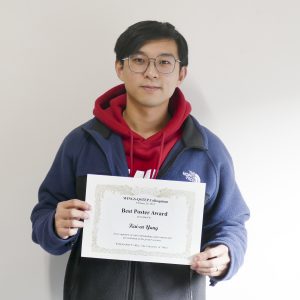2024年03月14日
【Awards and Commendations】 Kai-en, YANG, Sakai labo, Department of Nuclear Engineering and Management, (D2), received “Best Poster Award” at Q-STEP Colloquium
On 29th Feb 2024, Kai-en, YANG, Sakai labo, Department of Nuclear Engineering and Management, (D2), received “Best Poster Award” at Q-STEP Colloquium.
〈Name of award and short explanation about the award〉
Best Poster Award
It was given for the best posters in the Q-STEP Colloquium.
〈About awarded research〉
Title: On Fostering Predictions in Data-driven Reduced Order Model for Eulerian-Lagrangian Simulations: Decision of Sufficient Training Data
Development of a data-driven surrogate model (SM) is extensively studied in Eulerian-Lagrangian simulations for its advantage of high computational speed. However, in the application of granular systems with violent fluid-solid flows, how to select sufficient training data to ensure consistency between the high-fidelity model and SM remains unknown and highly challenging. The accuracy of SM can be easily deteriorated due to insufficient training data. This necessitates trial-and-error process and hinders its industrial applications. To address this issue, this study newly reveals a finding that the data density is a key to sufficient training, and propose a novel technique for deciding the sufficient training data of SM. Specifically, a feasibility index is proposed based on posterior error analysis. It is demonstrated that when the training data is determined under proposed feasibility index > 2, the consistency of granular dynamics between SM and high-fidelity model can be guaranteed. Employed in a representative SM, a reduced order model (ROM), this technique enables the successful decision of sufficient training data, resulting in the remarkable predictability in violent fluid-solid flows without trial-and-error. This technique holds great potential in solving the predicament of deciding training data for data-driven models. This work has been published on an international journal. ( https://doi.org/10.1080/00219592.2024.2316155 )
〈Your impression & future plan〉
It is truly my pleasure to be awarded one of the best posters in the very competitive Q-STEP colloquium, where numerous quantum science research was conducted. My highest appreciation belongs to all the Sakai Lab members, especially Prof. Sakai, Dr. Guangtao Duan, and Dr. Shuo Li. It was their selfless and continued support that helped me to achieve this outstanding outcome.
Focusing on the digitalization of powder process, I will commit myself to the research aiming at realizing the digital twin of multi-phase powder process through data-driven reduced order model.



